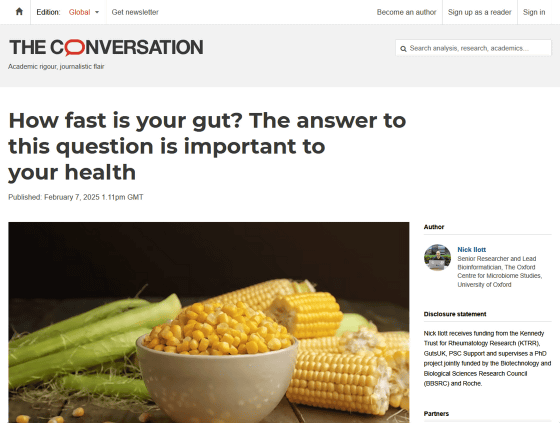What is the 'sweet corn test' that measures the time it takes for food to pass through the stomach and intestines?

Many health-conscious people pay attention to the nutritional value and variety of the food they eat, but few may be concerned about the speed at which food passes through the stomach and intestines.
How fast is your gut? The answer to this question is important to your health
https://theconversation.com/how-fast-is-your-gut-the-answer-to-this-question-is-important-to-your-health-248701

Digestion of food by the stomach and intestines
When a person chews and swallows food, the food is churned and digested in the stomach, various nutrients are absorbed in the small intestine, water and salt are absorbed in the large intestine, and finally it is excreted from the anus. The movement of food through these digestive tracts is called peristalsis, and the process is partly controlled by trillions of bacteria that live in the intestines.
These gut bacteria produce metabolites from food that reaches the intestine, which strengthens the human immune system and stimulates the intestinal nerves to promote peristalsis and move food forward. 'Without these bacteria and their metabolites, our intestines would not be able to move food through the gastrointestinal tract. This can lead to the accumulation of ingested food, which can cause constipation and discomfort,' explains Ilott.

Gastrointestinal transit time
The time from when food enters the mouth until it is excreted as feces is called the 'gut transit time,' and recent
Normally, gut bacteria feed on dietary fiber to produce metabolites, but if the gastrointestinal transit time is too long and it takes too long for dietary fiber to reach the gut, they will feed on protein instead of dietary fiber. When the food source switches from dietary fiber to protein, toxic gases are produced as metabolic products, which can cause health problems such as bloating and inflammation. In addition, if food transits slowly, partially digested food can remain in the small intestine for a long period of time, which can lead to excessive growth of small intestinal bacteria and symptoms such as abdominal pain, nausea, and bloating.
On the other hand, conditions such as anxiety, inflammatory bowel disease (IBD) and irritable bowel syndrome (IBS) can also shorten gastrointestinal transit time, which means food doesn't stay in the intestine long enough, preventing the absorption of nutrients and water, which can lead to diarrhea and dehydration.

◆Sweet corn test
Gastrointestinal transit time has a huge impact on human health, but few people know their own gastrointestinal transit time. So Ilott introduces the 'sweet corn test' as a way to check your intestinal motility.
First, you go without corn for 7 to 10 days, then note the date and time and eat a handful of corn kernels. The outer shell of corn is made of a tough fiber called cellulose, but the human body does not have the enzymes or intestinal bacteria to break down cellulose, so
After eating corn, check each time you have a bowel movement to see if there are any corn kernels in your bowel movement, and if so, note the date and time of excretion. By comparing the date and time of eating corn with the date and time of excretion, you can determine how long it takes for the food you ate to be excreted from your mouth.
If it takes less than 12 hours for corn to be excreted, your gastrointestinal transit time is too short, and if it takes more than 48 hours, your gastrointestinal transit time is too long. If your gastrointestinal transit time is consistently short, you should see a doctor to find out the underlying cause. On the other hand, if your gastrointestinal transit time is consistently too long but you don't have any additional gastrointestinal symptoms such as bloating or abdominal pain, you may be able to improve your condition by eating more fruits and vegetables to increase the dietary fiber that feeds your gut bacteria, drinking more water, and exercising. 'Eating a balanced diet will keep your gut moving and healthy,' said Aylott.

Related Posts:







